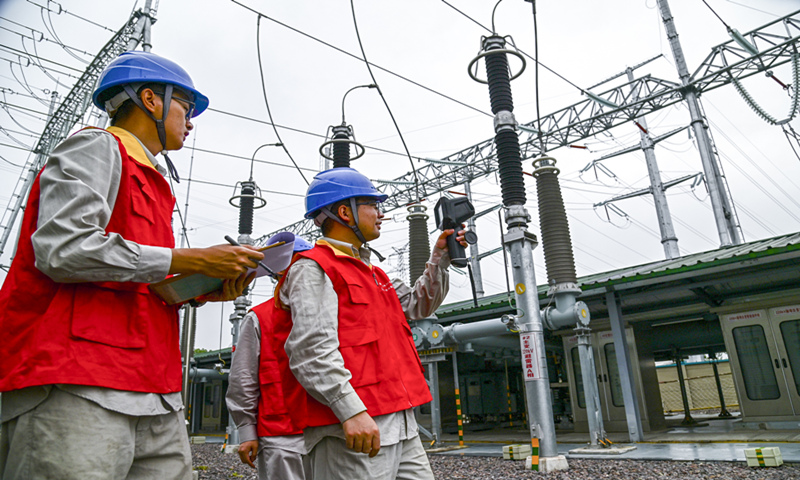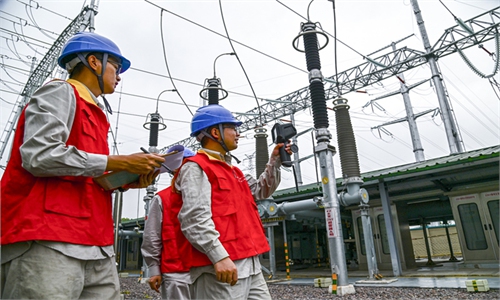
Workers check equipment at a power station in Jinhua, East China's Zhejiang Province on Monday to ensure stable operation. To meet high demand for power, China produced 3177 billion kilowatt-hours of electricity from January to May, up 14.9 percent year-on-year. Photo: VCG
A number of provinces and regions in China have told local industrial companies to use electricity in an "orderly" way amid a supply gap and peak summer demand, with some companies having had to cut production to abide by government regulations.However, on the whole, the country's economic recovery will not be greatly affected by the restrictions on power usage, experts said.
In South China's Guangdong Province, local factories can only work six days a week and they must avoid operating at times of peak power use, a staffer from the sales department of JZ Energy Co in Guangzhou told the Global Times on Sunday.
"Guangdong Province's power situation is roughly same as in the middle of July... the current power limits have little impact on local industries, and adjustments on the demand side are also being implemented," the staffer said.
Guangdong started power use management in May, when it ordered factories to work only four days a week. The restrictions eased in July, but overall, the power shortages will not ease until later this month, an employee of the China Southern Power Grid was quoted by some media outlets as saying recently.
Likewise, Southwest China's Yunnan Province has tightened curbs on local factories' power usage. On July 27, aluminum producer Yunnan Shenhuo Aluminum Industry Co was ordered to limit its power load. The company had to suspend the use of 35 electrolytic tanks as a result, according to a filing submitted by Henan Sunho Group Co, Yunnan Shenhuo's parent company, to the Shenzhen Stock Exchange.
In May, the company received similar notices amid a shortage of electricity in Yunnan. So far, it has halted 200,000 tons of production capacity and 145 electrolytic tanks, with only 61 percent of its capacity being used.
As a result, Yunnan Shenhuo will not be able to meet its goal of making 800,000 tons of aluminum in 2021, a goal it set at the beginning of this year, the filing noted.
In Nanning, South China's Guangxi Zhuang Autonomous Region, the government also issued a notice telling government departments, enterprises, public institutions and places where air-conditioning is consumed on a large scale to use electricity in an orderly way. In the county of Quyang, industries were also told to use electricity in an orderly way.
Earlier, China Southern Power's Grid's Guangxi branch estimated that Guangxi would have a power shortfall of 1 to 2 million kilowatts at peak time, according to media reports.
Lin Boqiang, director of the China Center for Energy Economics Research at Xiamen University, said power supply tightness is normal during the summer. This year, it's impossible to avoid the situation, given the high temperatures and China's rapid economic recovery after the pandemic.
"Normally, local governments first restrict power use by energy-intensive, low-margin factories. Industries like cement, steel and nonferrous metals are easy targets," Lin told the Global Times.
Lin said that Guangdong has relied on regions like Yunnan for electricity. "When regions like Yunnan have problems with electricity themselves, Guangdong will share the problem," he said. But key industries and exports are unlikely to take too much of a hit from the situation, Lin noted.


